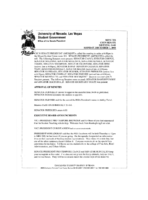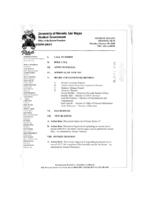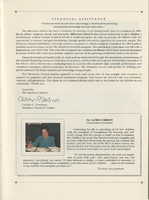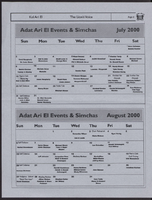Search the Special Collections and Archives Portal
Search Results

Meeting minutes for Consolidated Student Senate, University of Nevada, Las Vegas, December 01, 2003
Date
2003-12-01
Archival Collection
Description
Includes meeting minutes. CSUN Session 34 Meeting Minutes and Agendas.
Text

Meeting minutes for Consolidated Student Senate University of Nevada, Las Vegas, August 30, 1999
Date
1999-08-30
Archival Collection
Description
Includes meeting agenda and minutes, along with additional information about bylaws and supplemental agendas.
Text

Meeting minutes for Consolidated Student Senate, University of Nevada, Las Vegas, July 09, 2001
Date
2001-07-09
Archival Collection
Description
Includes meeting minutes and agenda, along with additional information about evaluations regarding the Stree-Free Zone, entertainment and programming of Fall events, letters, CSUN services opperating policy, bylaws, and performance agreements.
Text

Meeting minutes for Consolidated Student Senate, University of Nevada, Las Vegas, October 30, 2000
Date
2000-10-30
Archival Collection
Description
Includes meeting minutes and agenda, along with additional information about letters. CSUN Session 30 (Part 2) Meeting Minutes and Agendas.
Text

Meeting minutes for Consolidated Student Senate, University of Nevada, Las Vegas, November 17, 2003
Date
2003-11-17
Archival Collection
Description
Includes meeting minutes. CSUN Session 34 Meeting Minutes and Agendas.
Text

Congregation Ner Tamid Annual Report, 2006-2007
Date
2006 to 2007
Archival Collection
Description
2006-2007 annual report for Congregation Ner Tamid on the Greenspun Campus for Jewish life, learning, and spiritual renewal. The report includes statements, events, communities activities, statements, and photographs.
Mixed Content

Program from event at Treasure Island at the Mirage, Tenth Anniversary Scholarship Benefit for the Meadows School, May 20, 1994
Date
1994-05-20
Archival Collection
Description
The "Presidential Evening" event at Treasure Island was held to raise funds for the Nat Hart Scholarship Endowment Fund and General Scholarship Fund for the Meadows School in Las Vegas.
Text
Pagination
Refine my results
Content Type
Creator or Contributor
Subject
Archival Collection
Digital Project
Resource Type
Year
Material Type
Place
Language
Records Classification



